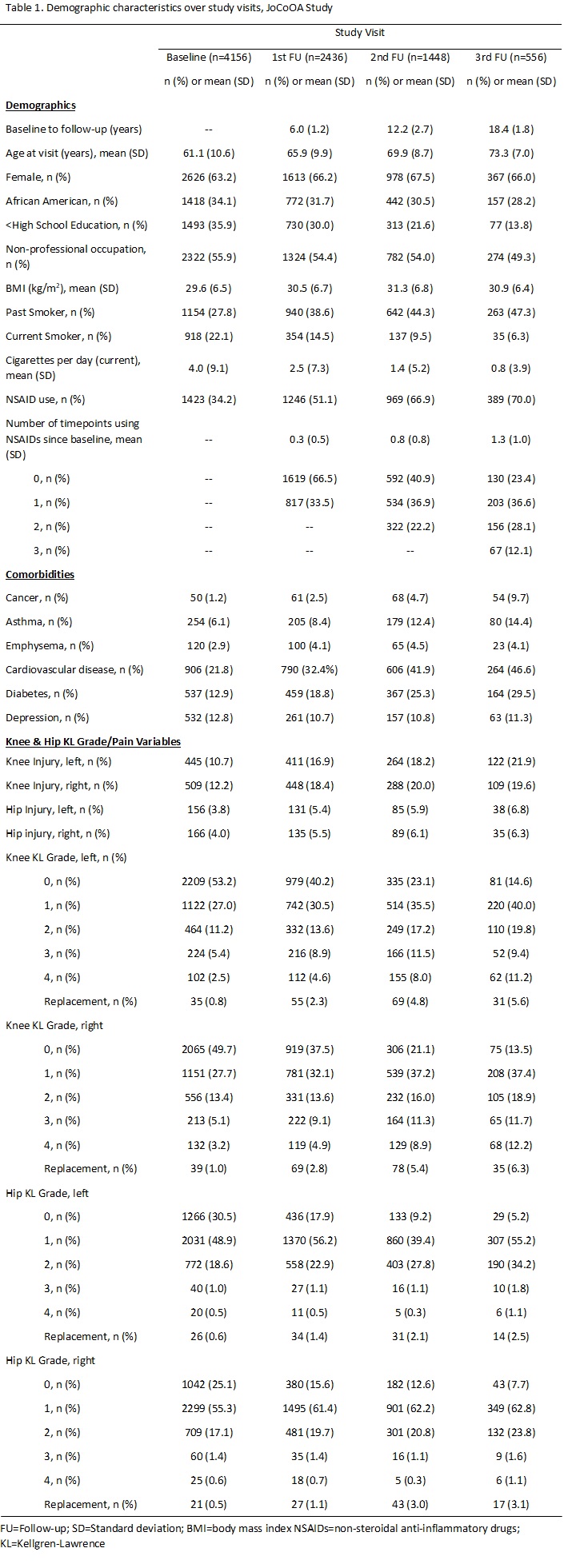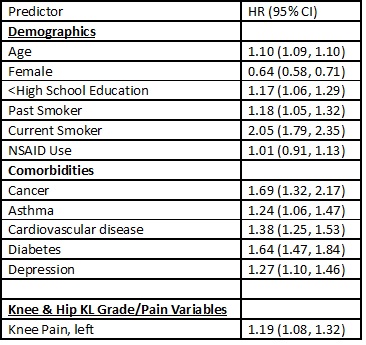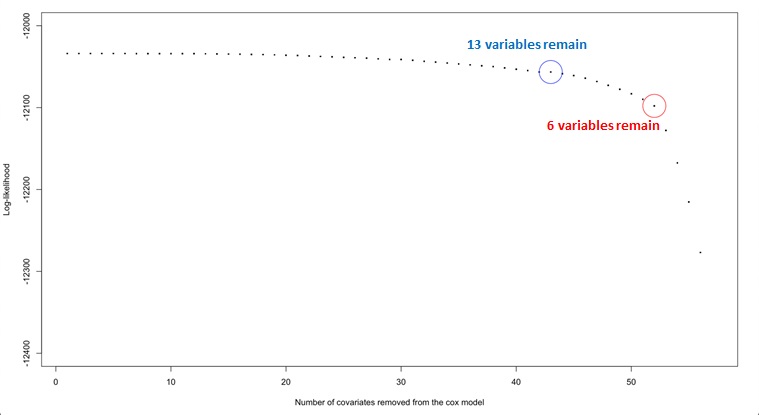Session Information
Session Type: Poster Session B
Session Time: 8:30AM-10:30AM
Background/Purpose: Radiographic osteoarthritis (rOA) and joint symptoms at the knee and hip are predictors of mortality. However, questions remain about the nature of the relationship and if there are other predictors, or combinations of predictors, that contribute to increased mortality. Since non-steroidal anti-inflammatory drugs (NSAIDs) have been shown to increase risk of death and are widely used by those with OA, we applied novel statistical methods to identify a set of predictors of mortality, and whether these predictors interact with NSAID use
Methods: Data were from 4,156 participants in the Johnston County Osteoarthritis Project (JoCoOA), a longitudinal community-based cohort of Black and White men and women aged ≥45 years. Vital status was assessed using the National Death Index records to capture date of death through December 2015. Clinical exams, radiographs and questionnaires were completed at baseline and at up to 3 follow-up time points. Socio-demographic and clinical characteristics, including comorbidities and joint symptoms, were considered as predictors and NSAID use was considered as an effect modifier. Multiple imputation was used for missing data.
We applied a time-varying covariate stratified cox model with recursive feature elimination (RFE). RFE searches for a subset of predictors starting with a full model including all predictors in the training dataset, and successively removing one at a time. Our model initially included 57 predictors, with NSAID use entered as an interaction term with all other predictors. A model with the smallest change in log-likelihood from the full model was selected and that predictor, along with its interaction with NSAID use, was dropped. This process was repeated until no predictors remained in the model. Using a plot of the log-likelihoods after each elimination, the final model was selected based on an inflection point prior to a notable decrease in log-likelihood (Figure 1). All observations were stratified by the time point, and hazard ratios (HR) and 95% confidence intervals (CI) were estimated.
Results: Mean age of the participants at baseline was 61 years, 63% were female and 66% were white (Table 1). More than 34% of participants reported taking NSAIDs at baseline, which increased to 51%, 67%, and 70% at the first, second, and third follow-up, respectively, over which time 1,812 deaths occurred.
In the RFE model, we found that after iterative predictor elimination, 13 predictors showed an important contribution to excess death (Figure 1, Table 2). The strongest contributors were current smoking status, cancer, diabetes and male sex. Left knee pain was associated with a 19% increased HR. We observed an NSAID-modified association with right knee injury where those with a knee injury and no NSAID use had a 30% lower hazard of mortality, whereas little association was observed for right knee injury among those who used NSAIDs.
Conclusion: We show that an application of a RFE algorithm is useful to both select the important predictors, and to quantify predictive validity, on excess mortality. The model demonstrated good performance in selecting a set of predictors and identifying characteristics most important in premature death that can be explored in future analyses.
To cite this abstract in AMA style:
Kim S, Xiang S, Arbeeva L, Alvarez C, Nelson A, Golightly Y, Callahan L, Kosorok M, Cleveland B. Application of a Modified Recursive Feature Elimination Machine Learning Algorithm to Select Predictors of Mortality in Those with and Without Osteoarthritis [abstract]. Arthritis Rheumatol. 2021; 73 (suppl 9). https://acrabstracts.org/abstract/application-of-a-modified-recursive-feature-elimination-machine-learning-algorithm-to-select-predictors-of-mortality-in-those-with-and-without-osteoarthritis/. Accessed .« Back to ACR Convergence 2021
ACR Meeting Abstracts - https://acrabstracts.org/abstract/application-of-a-modified-recursive-feature-elimination-machine-learning-algorithm-to-select-predictors-of-mortality-in-those-with-and-without-osteoarthritis/



